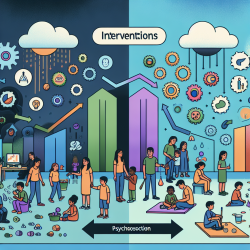Understanding the Impact of Parental Substance Misuse on Children
Parental substance misuse is a pervasive issue that affects approximately 5-10% of children globally. The ramifications for children in these environments are profound, encompassing increased risks of abuse, neglect, poor cognitive development, and even future substance misuse. The complex interplay of risk factors such as parental psychopathology, domestic violence, and poverty exacerbates these outcomes, making intervention crucial.
Intervention Strategies: A Data-Driven Approach
The comprehensive review titled "PROTOCOL: Psychosocial, pharmacological and legal interventions for improving the psychosocial outcomes of children with substance misusing parents" aims to synthesize existing research on interventions. The review categorizes interventions into psychosocial, pharmacological, and legal domains, each targeting different aspects of the child's environment and parental behavior.
1. Psychosocial Interventions
These interventions focus on improving the psychological and social well-being of families. Examples include home-visiting programs, which involve regular visits by health practitioners to provide support and education to parents. The evidence suggests that these programs can improve both maternal and child health outcomes, especially when initiated early.
2. Pharmacological Interventions
Pharmacological approaches involve the use of medications to treat parental substance misuse, thereby reducing exposure and improving developmental outcomes for children. For instance, medications like buprenorphine have shown efficacy in reducing drug use among parents, leading to better psychosocial environments for children.
3. Legal Interventions
Family Treatment Drug Courts (FTDCs) represent a legal intervention where the court system collaborates with families to address substance misuse and child welfare issues. These courts use a non-adversarial approach, focusing on treatment compliance and child safety, which has been shown to improve family outcomes.
Implications for Practitioners
Practitioners working with children from substance-misusing families should consider these intervention strategies as part of a comprehensive care plan. The data-driven approach of the review provides a robust framework for selecting interventions based on their comparative effectiveness. Practitioners are encouraged to delve deeper into the research to tailor interventions to the specific needs of their clients.
Encouraging Further Research
While the review provides a solid foundation, there is a need for ongoing research to fill gaps in existing literature. Practitioners and researchers alike are encouraged to contribute to this body of work, ensuring that interventions continue to evolve and improve outcomes for children.
To read the original research paper, please follow this link: PROTOCOL: Psychosocial, pharmacological and legal interventions for improving the psychosocial outcomes of children with substance misusing parents.










